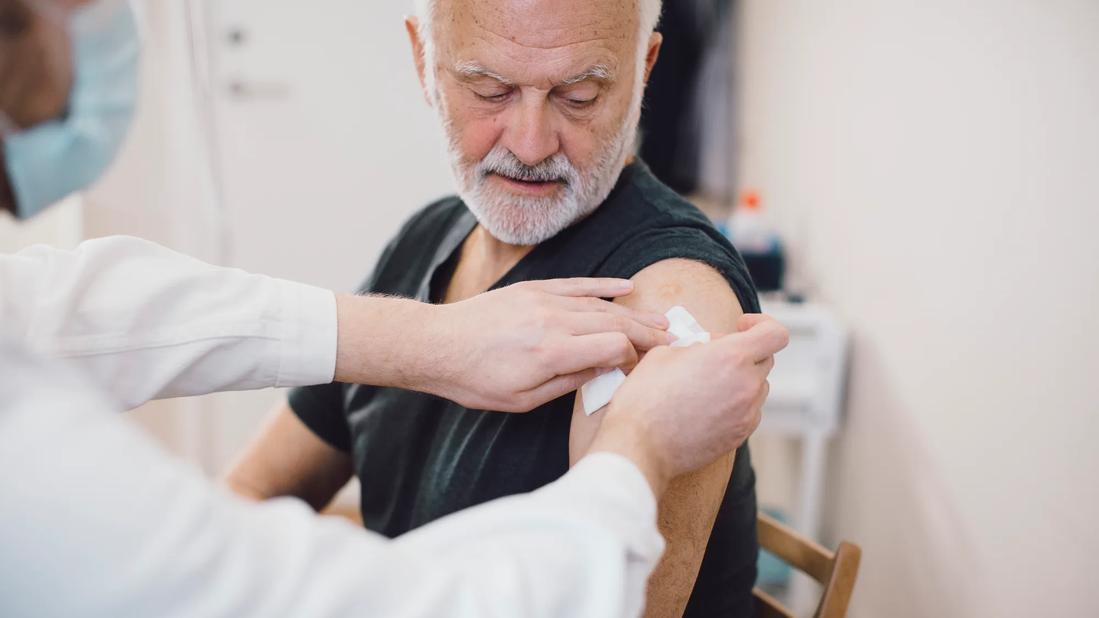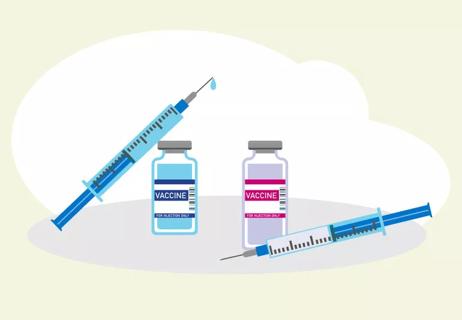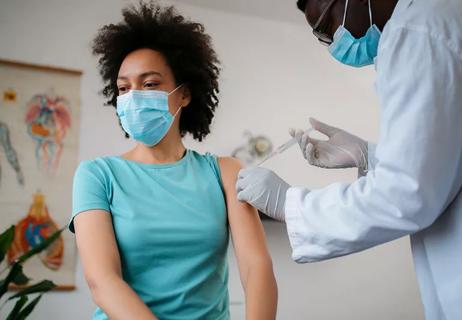From influenza and COVID-19 to pneumococcal, shingles and more, vaccines help keep you healthy

You may think your days of sitting in the doctor’s office with a cotton ball on your shoulder are over. But while your shots may not come with a superhero bandage anymore, there are a number of immunizations that doctors often recommend for adults, depending on your age, health and lifestyle.
Advertisement
Cleveland Clinic is a non-profit academic medical center. Advertising on our site helps support our mission. We do not endorse non-Cleveland Clinic products or services. Policy
“Vaccine immunity wanes over time,” explains family medicine physician Neha Vyas, MD. “So, vaccines that we got as children may no longer be effective.”
What’s more, certain infectious diseases can affect older adults more than younger people. So, as you age, you can benefit from vaccines to protect you from potentially severe infections.
Dr. Vyas and geriatric and internal medicine specialist Ardeshir Hashmi, MD, explain what vaccines are recommended for adults, when to get them and why they matter.
Whether you’re headed off to college or have been empty-nesting it for years, there are several immunizations that are recommended to help protect you against a host of infections.
“Bacteria and viruses mutate over time. Keeping current with vaccines can help prevent against getting an infection or lessening the severity of an illness,” says Dr. Vyas.
So, for starters, yes, keeping up with vaccines helps keep you healthy.
But there’s another layer to it.
When many people choose vaccination, it can also help slow the spread of illness in the community, offering added protection to vulnerable groups.
Think of herd immunity as an environment where viruses can’t spread. Germs need to infect people in order to survive. It’s what they do.
Advertisement
When people are vaccinated, they develop defenses to kill off infections. If enough people are vaccinated, viruses can’t hop from one person to the next, spreading disease around. And so the germs die off.
“If everybody gets vaccinated, then some of these illnesses will actually go away. There won’t be enough opportunities for viruses to invade hosts and keep going,” Dr. Vyas explains.
Your specific vaccine needs will depend on a number of factors, including:
It can be hard to remember what all you’ve been vaccinated for and when. Childhood memories of those appointments fade. Your medical records may not be digitized or shared across healthcare systems. And your original COVID-19 vaccination card seems to be hiding in the depths of your glove box these days (at least you think that’s where it is).
No worries.
If you’re not sure if you’re due for vaccines, a healthcare provider can check by doing a quick antibody test. That’s a blood test that looks for signs of immunity against infections.
Depending on your results, a provider may recommend that you get some new vaccines for protection.
Vaccines protect you and the people around you. So, staying current matters for your health and for broader society.
Here’s a quick look at some of the vaccines that your healthcare provider may recommend:
| Vaccine | Who needs it | How often |
|---|---|---|
| Flu | Everyone | Every respiratory season |
| COVID-19 | Everyone | Every time a new vaccine becomes available, about once per year |
| Tdap | Everyone | One every 10 years |
| HPV | Adults ages 45 and younger who haven’t been vaccinated and who are in risk groups for infection | Once |
| MMR | Adults who haven't been vaccinated or whose immunity has worn off | One or two doses, depending on your risk |
| Hepatitis B | Adults under the age of 60 who haven’t been vaccinated and who are in risk groups for infection | One series (two to four doses) |
| Varicella | Adults who haven’t been vaccinated and haven’t had chickenpox | One series (two doses) |
| RSV | If you're pregnant and/or an adult aged 60 and older | One dose every two years, around the beginning of respiratory season |
| Shingles | Adults over the age of 50 | One series (two doses) |
| Pneumococcal | Adults over the age of 65 and anyone at high risk | One dose or more, depending on the type of vaccine given |
| Vaccine | ||
| Flu | ||
| Who needs it | ||
| Everyone | ||
| How often | ||
| Every respiratory season | ||
| COVID-19 | ||
| Who needs it | ||
| Everyone | ||
| How often | ||
| Every time a new vaccine becomes available, about once per year | ||
| Tdap | ||
| Who needs it | ||
| Everyone | ||
| How often | ||
| One every 10 years | ||
| HPV | ||
| Who needs it | ||
| Adults ages 45 and younger who haven’t been vaccinated and who are in risk groups for infection | ||
| How often | ||
| Once | ||
| MMR | ||
| Who needs it | ||
| Adults who haven't been vaccinated or whose immunity has worn off | ||
| How often | ||
| One or two doses, depending on your risk | ||
| Hepatitis B | ||
| Who needs it | ||
| Adults under the age of 60 who haven’t been vaccinated and who are in risk groups for infection | ||
| How often | ||
| One series (two to four doses) | ||
| Varicella | ||
| Who needs it | ||
| Adults who haven’t been vaccinated and haven’t had chickenpox | ||
| How often | ||
| One series (two doses) | ||
| RSV | ||
| Who needs it | ||
| If you're pregnant and/or an adult aged 60 and older | ||
| How often | ||
| One dose every two years, around the beginning of respiratory season | ||
| Shingles | ||
| Who needs it | ||
| Adults over the age of 50 | ||
| How often | ||
| One series (two doses) | ||
| Pneumococcal | ||
| Who needs it | ||
| Adults over the age of 65 and anyone at high risk | ||
| How often | ||
| One dose or more, depending on the type of vaccine given |
Drs. Vyas and Hashmi explain more.
The flu vaccine is one option many doctors recommend to lower the risk of severe illness, especially in older adults or those with chronic conditions.
Health authorities recommend getting a flu vaccine every year, ideally in early fall, just ahead of the respiratory season, for people in the Northern Hemisphere.
This annual vaccine protects against influenza and it’s recommended for everyone 6 months old and older. It’s especially important for people who are:
Some providers recommend updated COVID-19 vaccines, particularly for older adults or those with underlying health conditions. Talk with your doctor about whether it’s right for you.
“The benefit of staying current with COVID-19 vaccines is that it can lower your risk for severe infection,” Dr. Hashmi points out. “It may not keep you from getting sick. But it can help lower your risk for serious complications and hospital stays.”
Advertisement
You likely received the DTaP vaccine as a child. That’s the kids’ version of Tdap. They provide protection against the same diseases:
But immunity against these conditions wanes over time. All adults ages 19 and over should get a Tdap vaccine booster every 10 years.
If you’re pregnant or will be spending time with young children, your provider may recommend a Tdap vaccine, too, to help protect young babies who are too little to be vaccinated yet.
The HPV vaccine is recommended for everyone between the ages of 9 and 45. It came out in 2006. And while it’s now a recommended routine immunization for kids, some people may have missed getting it as a child.
The HPV vaccine protects you from human papillomavirus (HPV), which can cause conditions like:
This vaccine was originally recommended for individuals up to age 26, but the age range has been extended up to age 45 for certain adults. Talk with a healthcare provider about whether this extended age recommendation applies to you.
If you haven’t yet been vaccinated and are at risk, talk to a healthcare provider about getting this vaccine at your next appointment.
Advertisement
This vaccine is especially necessary because it’s a three-in-one.
The MMR vaccine, which is recommended for adults under 50, protects against measles, mumps and rubella. It’s recommended for children, with the first dose given between the ages of 12 and 15 months, and the second dose given between 4 and 6 years of age.
If you received this vaccine as a child, you may not need another. But it would be safe to check with your provider to see if you could benefit from another dose.
The hepatitis B vaccine is strongly recommended for adults ages 19 through 59. It protects against hepatitis B, which is an infection that attacks your liver and can cause serious illness.
The CDC recommends hepatitis B vaccination for adults aged 60 years and older who are in risk groups for hepatitis B virus infection. But any adult 60 or older who wants to be protected from hepatitis B may be vaccinated even if they don’t have specific risk factors.
It became a part of the routine childhood immunization schedule in the mid-1980s, so depending on when you were born, you may or may not have received this vaccine.
The CDC recommends two doses of the varicella vaccine, which prevents chickenpox, for children and adults.
Advertisement
Children in the U.S. began receiving this vaccine in 1995. If you didn’t receive this vaccine as a child and never had chickenpox, you should schedule with a provider to receive this immunization. Chickenpox can be severe in adults.
Respiratory syncytial virus (RSV) tends to be more severe for older people and little babies. RSV vaccines are available if you're 60 and older and/or pregnant to protect the developing fetus.
“After the age of 65 and especially after the age of 80, for every one of us, the immune system starts to go down, which makes us more susceptible to infection,” Dr. Hashmi shares.
The shingles vaccine protects against shingles — a disease caused by the varicella-zoster virus.
Sound familiar? That’s because it’s the same virus that causes chickenpox. And over time, that virus can become active again, causing shingles — a painful rash or blisters that can be difficult to manage.
That’s why this vaccine is strongly recommended for people 50 and over.
This vaccine helps prevent pneumococcus bacterial infections, which can lead to issues like:
The pneumococcal vaccine is recommended for adults 65 and older. It’s also recommended for younger adults who smoke or who live with chronic conditions like:
Depending on your overall health and lifestyle, you may receive either a one-time vaccine or you may need a follow-up booster a year after your initial vaccination. It depends on the type of vaccine you received. Talk to a healthcare provider about what’s best for you.
If you work in healthcare, it’s important that you stay current on all the vaccines listed here. In fact, your workplace may require them.
You may also benefit from some immunizations, such as the meningococcal vaccine, which protects against bacterial meningitis.
Talk with your employer about any recommended and required vaccines for your workplace.
Gearing up to see the world? Before hopping on that plane or shipping off on that cruise, be sure to know what vaccines you may need.
When it comes to vaccines needed for travel, it’ll depend on which country you’re visiting. One easy way to do this is to go to the CDC’s traveler’s health website and input your travel destination.
In general, if you’re traveling overseas from the U.S., you can expect to need to be up-to-date on the vaccines already mentioned. It may also be recommended to get vaccinations against illnesses like:
If you haven’t received any vaccinations since you sat in your pediatrician’s office as a kid, consider talking to your primary care provider about your immunity. Many people have questions about vaccines. Your care team encourages you to bring them up in your appointment. They want you to feel comfortable with your decisions.
Learn more about our editorial process.
Advertisement

Tetanus is easy to prevent but tough to treat — vaccines are your best defense

Older studies suggesting a link have been completely discredited — vaccinations are safe and effective

Baby’s caregivers should be up-to-date on flu, COVID-19 and Tdap vaccines to protect the newborn in their lives

The answer varies from person to person and vaccine to vaccine

Getting routine vaccinations together can save you time and may be more effective

They can stop an infection before it gets you sick or prevent you from becoming seriously sick

Previous vaccines against smallpox might provide some protection

Pain after a vaccine is normal — but here's how you can avoid it

Wearing a scarf, adjusting your outdoor activities and following your asthma treatment plan can help limit breathing problems

Your diet in the weeks, days and hours ahead of your race can power you to the finish line

When someone guilt trips you, they’re using emotionally manipulative behavior to try to get you to act a certain way